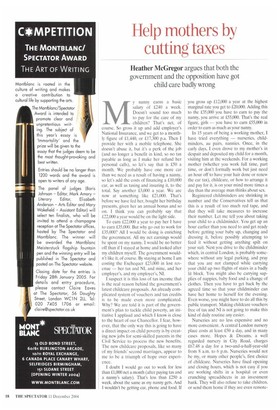Help mothers by cutting taxes
Heather McGregor argues that both the government and the opposition have got child care badly wrong My nanny earns a basic salary of £240 a week. Doesn't sound too much to pay for the care of my children? That's net, of course. So gross it up and add employer's National Insurance, and we get to a monthly figure of £1,440, or £17,300 p.a. Then I provide her with a mobile telephone. She doesn't abuse it, but it's a perk of the job (and no longer a benefit in kind, so no tax payable as long as I make her refund her personal calls), so let's say that is £50 a month. We probably have one more car than we need as a result of having a nanny, so let's add the costs of financing a £10,000 car, as well as taxing and insuring it, to the total. Say another £3,000 a year. We are now at something like £21,000. That's before we have fed her, bought her birthday presents, given her an annual bonus and so on. I think you can probably say that £22,000 a year would be on the light side.
To earn £22,000 a year to pay her I have to earn £35.000. But why go out to work for £35,000? All I would be doing is enriching the government. All my net earnings would be spent on my nanny. I would be no better off than if I stayed at home and looked after my children myself. The government wouldn't like it, of course. By staying at home I am costing the Exchequer £23,000 in lost revenue — her tax and NI, and mine, and her employer's, and my employer's, NI.
I suspect it is this loss of tax income that is the real reason behind the government's latest childcare proposals. An already complicated system of vouchers and tax credits is to be made even more complicated. Why? We are told it is part of the government's plan to tackle child poverty, an initiative I applaud and which I know is close to the heart of our Chancellor. I fear, however, that the only way this is going to have a direct impact on child poverty is by creating new jobs for semi-skilled parents in the Civil Service to process the new benefits. The new childcare proposals, like so many of my friends' second marriages, appear to me to be a triumph of hope over experience.
I doubt I would go out to work for less than £1,000 net a month (after paying tax and a nanny's salary). That's less than £250 a week, about the same as my nanny gets. And I wouldn't he getting car, phone and food. If you gross up £12,000 a year at the highest marginal rate you get to £20,000. Adding this to the £35,000 you have to earn to pay the nanny, you arrive at £55,000. That's the real figure, girls — you have to earn £55,000 in order to earn as much as your nanny.
In 15 years of being a working mother, I have tried everything — nurseries, childminders, au pairs, nannies. Once, in the early days, I even drove to my mother's in despair and deposited my child for a month, visiting him at the weekends. For a working mother (whether you work full time, part time, or don't formally work but just need an hour off to have your hair done or renew the car tax), childcare, or how to arrange it and pay for it, is on your mind more times a day than the average man thinks about sex.
Registered childminders are shrinking in number and the Conservatives tell us that this is a result of too much red tape, and that they will take measures to increase their number. Let me tell you about taking your child to a childminder. You get up an hour earlier than you need to and get ready before getting your baby up, changing and dressing it, before possibly attempting to feed it without getting anything spilt on your suit. Next you drive to the childminder which, in central London, is probably somewhere without any legal parking, and pray that you are not clamped while carrying your child up two flights of stairs in a badly lit block. You might also be carrying supplies of nappies, baby food and a change of clothes. Then you have to get back by the agreed time so that your childminder can have her home to herself for the evening. Even worse, you might have to do all this by public transport. Making childcare vouchers free of tax and NI is not going to make this kind of daily routine any easier.
Nurseries are no less expensive and no more convenient. A central London nursery place costs at least £50 a day, and in many cases more. Hopes & Dreams, a well regarded nursery in City Road, charges £67.48 a day for a two-and-a-half-year-old from 8 a.m. to 6 p.m. Nurseries would not be my, or many other people's, first choice of childcare. Nurseries have fixed opening and closing hours, which is not easy if you are working shifts in a hospital or even crunching spreadsheets in an investment bank. They will also refuse to take children, or send them home if they are even remote ly unwell. This is unsurprising, as sick children might easily pass on a cough or cold (or head lice) to all the others. Then what do you do? This is another practical issue with childcare that I don't see addressed in either the government's or the opposition's childcare proposals. The truth is that the vast majority of jobs in this country are now in the service sector. If you need to stay late to get a client proposal together or finish a project that was promised for the next day, getting to a nursery in City Road by 6 p.m. may prove a little difficult.
The opposition says that there need to be three types of policies — for the full-time, the part-time, and the stay-at-home mother. This is nonsense. All you men out there, on either side of the political divide, please wake up and realise that there is only one type of mother — a working one. We all work, Staying at home is one of the hardest jobs in the world. It is just unpaid. You still need some childcare, even if it is only occasional. In Australia, a country which produced my husband, and which I visit frequently, they have a considerable number of occasional childcare centres. These offer care for regular bookings or casual, one-off bookings to give you a break while you go shopping or attend a doctor's appointment. Why can't we do this here?
Making a fantastically complicated system even more so is not the way forward. Let's dump the idea of yet more complicated tax credits (and the civil servants to administer them) and instead provide free, or heavily subsidised, nursery care. Neither the government nor the opposition need worry that this will be used by the 18 per cent of families that the government estimates has an income of more than £50,000 a year — they will always prefer a nanny to a nursery or a childminder, Then I come to the vexed question of maternity leave, which is much on politicians' minds at the moment. This is the scourge of small businesses in particular. One of our key staff recently had a lovely baby boy, and she took a year off. This was tough in itself — covering for her (without replacing her) and praying that she would come back. She did, mainly because she found a wonderful nanny whom she was happy to have look after her child. But the nanny is now pregnant! And will be going on maternity leave! My employee is understandably concerned about — you guessed it — covering for her (without replacing her) and praying that she will come back. If she doesn't come back and my employee cannot find another nanny of similar quality, I worry that she will pack it in and look after her child herself. Now not only do my employees' reproductive tendencies have to be planned for, but also those of their nannies.
We even tried hiring women who were past the reproductive stage in an attempt to protect ourselves from further collateral damage. However, this doesn't always work either. One exceptional recruit in this cate gory stayed for two years before making a very happy second marriage to someone in the Foreign Office and disappearing for a four-year posting abroad as the wife of HM ambassador to a pleasant country in southern Europe. What are we doing? Keeping her job open for her (without replacing her) and praying that she will come back!
Both the government and the opposition have proposed extending paid maternity leave; the pre-Budget report says that paid maternity leave will be extended from six to nine months from April 2007. Michael Howard announced in a speech on 11 November that the Conservatives would look at extending it by up to a year, or concentrating a year's payments into six months. Mothers already have the right to a year's maternity leave — it is just that most of it is unpaid. Unpaid leave versus statutory maternity pay of £102.80 a week? I think I'd rather go back to work than either of those.
And now the government wants to 'give mothers the right to extend the proportion of this paid leave to the child's father', for which we are promised legislation by the end of the next Parliament. So even if I hire male staff I should be checking out their family plans, in case they too disappear in a puff of smoke — or nappies — for up to a year.
Finally, both sides want to extend school hours to care for children before and after school. The real issue with this, of course, is the school holidays, and the illness problem. Who will look after them then? Also ten hours of childcare, if you work an eighthour day and have some distance to commute, is just not enough. I'm afraid there is nothing for it, girls, hut to find that £55,000a-year job.
What we want, as women and as mothers, is support for whatever decision we make, The best way to do this is not through a system of complicated means-tested benefits administered by a bunch of costly civil servants. It is by reducing the heavily regressive tax burden on all parents, whatever political party they vote for. Then we can choose for ourselves what childcare we wish to avail ourselves of.
Heather McGregor is a former investment banker who is now a partner in an executive search company.











































































 Previous page
Previous page